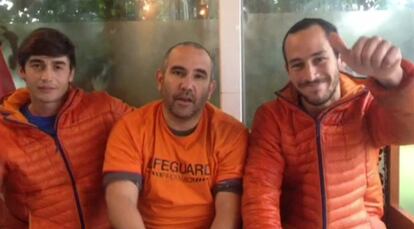“They treated us like terrorists,” claims freed Spanish aid worker
Three Seville firefighters helping refugees in Greece charged with human trafficking

Three Spanish firefighters who were arrested by Greek authorities last week while they were searching for a group of refugees off the coast of Lesbos were due to return home to Seville on Monday.
After spending three days in a Greek jail, they were released on bail on Saturday night after being charged with human trafficking.
Their nightmare began at around 3am Thursday when Julio Latorre – one of the three firefighters – received an alert as he was helping a group of refugees who arrived on a vessel near the beach on the island of Lesbos.
“They took our fingerprints and our mugshots, but at no point did they tell us that we were under arrest”
A fellow volunteer aid worker said that another boat carrying a group of migrants was sinking in the middle of the Aegean Sea.
“We then headed to the area by boat but couldn’t find [the vessel]. We searched for the boat for some time with two spotlights without any luck,” explains the 32-year-old Latorre, who added that they had “navigated pretty far away from the shore.”
Besides the three Spaniards, two Danish volunteers were also with them.
At one point, another of the three, Manuel Blanco, warned that they were approaching Turkish waters.
“That’s when we decided to return, but within five minutes the port authority police appeared,” Latorre says.
After spending three nights in jail, Julio and his two other companions from the NGO Proem-aid were released on €15,000 bail after they were charged with human trafficking.
Until the investigation is concluded, the three won’t know whether the charges will be dropped or if they will have to eventually face trial. If convicted, they each face up to four years in prison.
“It is unbelievable that such jail cells still exist in 21st-century Europe”
In a telephone conversation with EL PAÍS, Latorre described the ordeal he and his friends have gone though over the past few days.
From the beginning, Latorre says, the officers insisted in escorting them but told them they were not in any trouble. “They took our information, fingerprints and took our mugshots. But at no point did they tell us that we were under arrest.”
But at around 11am, the demeanor of the police officers changed.
“They became aggressive. They threw us all in a jail cell, which measured about three square meters and was very dirty. It had one toilet … very inhumane,” says Latorre. “It is unbelievable that such jail cells still exist in 21st-century Europe.”
Latorre, Blanco and José Enrique Rodríguez – the third Spaniard who was arrested – were held inside the cell for hours along with the two Danish nationals.
“Then they told us that they were going to take us before a judge on charges of illegal trafficking of humans. They handcuffed us and took us away as if we were terrorists,” he recalls.
“We had to spend three nights in jail. Psychologically it has been very tough; it was an emotional rollercoaster ride”
Their lawyer had asked for a 48-hour delay so that he could review all the evidence. As such the five did not go before a judge until Saturday.
“We had to spend three nights in jail. Psychologically it has been very tough; it was an emotional rollercoaster ride.”
The three men were not aware of efforts being undertaken by the Spanish government and Proem-aid to secure their immediate release.
After hearing their arguments, the judge granted them bail at 9pm Saturday.
“Nevertheless, the Greek authorities are continuing their investigation. The €15,000 was a guarantee so that they would appear again in case it is necessary,” according to a Proem-aid spokesperson.
While Latorre, Blanco and Rodríguez return to Seville, three other aid workers from the organization will take their place in Lesbos.
English version by Martin Delfín.
Tu suscripción se está usando en otro dispositivo
¿Quieres añadir otro usuario a tu suscripción?
Si continúas leyendo en este dispositivo, no se podrá leer en el otro.
FlechaTu suscripción se está usando en otro dispositivo y solo puedes acceder a EL PAÍS desde un dispositivo a la vez.
Si quieres compartir tu cuenta, cambia tu suscripción a la modalidad Premium, así podrás añadir otro usuario. Cada uno accederá con su propia cuenta de email, lo que os permitirá personalizar vuestra experiencia en EL PAÍS.
¿Tienes una suscripción de empresa? Accede aquí para contratar más cuentas.
En el caso de no saber quién está usando tu cuenta, te recomendamos cambiar tu contraseña aquí.
Si decides continuar compartiendo tu cuenta, este mensaje se mostrará en tu dispositivo y en el de la otra persona que está usando tu cuenta de forma indefinida, afectando a tu experiencia de lectura. Puedes consultar aquí los términos y condiciones de la suscripción digital.








































